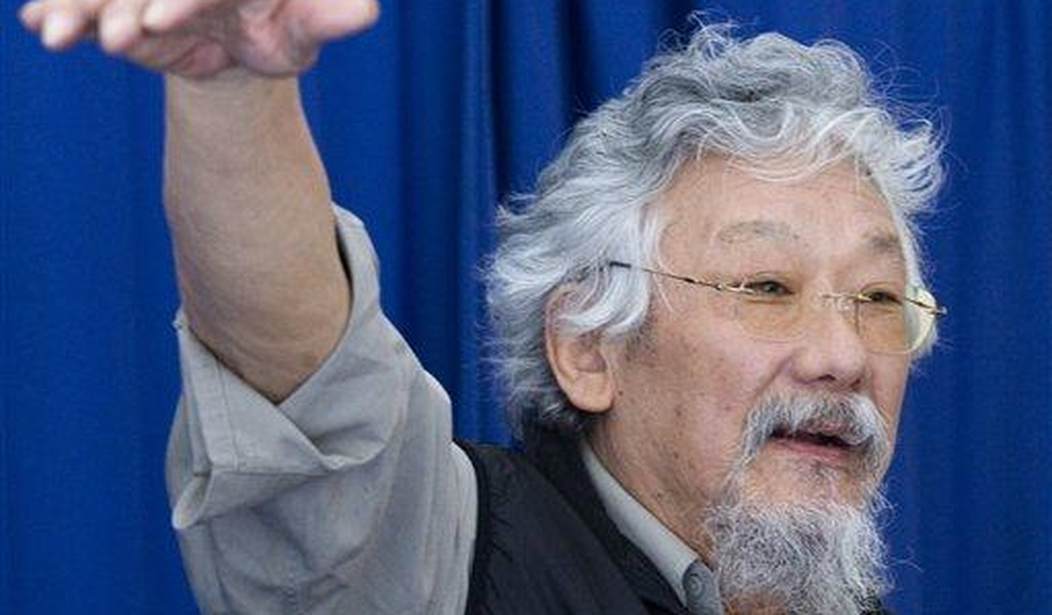Canada’s mini-Al Gore is up to his old tricks. Radical environmentalist David Suzuki, who transitioned from early fruit-fly expert to later doomsday prophet, is once more in the news, foretelling the eruption of violence against the construction of oil pipelines. “We’re in deep, deep doo-doo,” he said at an Extinction Rebellion event on Vancouver Island. “This is what we’re come to. The next stage after this, there are going to be pipelines blown up if our leaders don’t pay attention to what’s going on.”
Such violence, however, is not the violence of evil but only a justified reaction against the real violence being perpetrated by elected authorities who are “declaring war” against the pipeline protesters. One can’t help feeling that the oracle has lost his mojo since the Canadian government is hell-bent on destroying the country’s oil and gas energy infrastructure in favor of Big Green, just as Suzuki demands. The authorities, however, do not employ the rhetoric of violence in pursuing their agenda and, indeed, routinely deplore it. But the annihilation of the nation’s energy sector proceeds apace. As I pointed out previously, Suzuki and Prime Minister Justin Trudeau have resolved their quarrel as Trudeau’s Alberta-bashing, pipeline-busting antics have moved into high gear.
Recommended: On the Brink of Triumph, Green Faces Its Nemesis
Suzuki’s career is a lesson in the power of flim-flam. Having once compared human beings to maggots, and embarking on a career to save the planet from these soft-bodied larval excrescences, he gradually became a CBC celebrity as host of the popular weekly program The Nature of Things, and was named in a Reader’s Digest poll as the “most trusted” Canadian. His revolutionary zeal was second to none. This new-age evangelist went so far, at a conference on Feb. 28, 2008, held at McGill University in Montreal, as to recommend that politicians should be jailed for denying the presumably “settled science” of global warming, or climate change.
Yet, it appears that Suzuki’s knowledge of climate science is woefully inadequate, as his dismal performance at a lecture in Australia proved. As Janice Fiamengo wrote in an article for PJ Media, “Suzuki floundered and looked foolish,” claiming among other howlers “that data debunking the warming hypothesis comes from tainted sources (‘… there may be a climate skeptic down in Huntsville, Alabama …’)” though it actually “came from the major data-gathering stations…which anyone who had devoted a decade to preventing ‘catastrophic warming’ should have known.” He should have stuck to fruit flies. No matter. He retains his messianic status and continues to preach to the converted.
Radical environmentalism turns out to be a paying proposition. A recent book by Sheila Gunn Reid, The Case Against David Suzuki, details the spoils that accrue from environmental advocacy. Until recently the Chair of the non-profit David Suzuki Foundation, Suzuki charges $31,000 per speaking engagement and profits from multi-national American organizations that finance his campaigns against Canada’s oil sands production to the tune of $13 million Canadian. (Moreover, as Vivian Kraus writes in The Financial Post, “The problem with Suzuki’s American funding is that for many years it was underreported or not reported at all.”)
Suzuki had no hesitation in participating in an ad campaign for the Ontario Liberal government in direct contravention of the rules for tax-exempt corporations and owns three posh residences, one in Vancouver and two on the Gulf Islands. Saving the earth apparently allows one to acquire a goodly portion of it. With a personal fortune of $25 million, Suzuki’s assets do not compare with Al Gore’s resources, but in a Canadian context, one can say he is doing very well for himself. Whatever way one looks at it, environmental advocacy is a pretty lucrative gig.
Violence is being carried out both physically and legislatively against the oil industry, once the mainstay of Canada’s prosperity. But thanks in large part to Suzuki, violence is also being done to our national credibility and overall balance sheet as the country sinks into the economic doldrums.










Join the conversation as a VIP Member